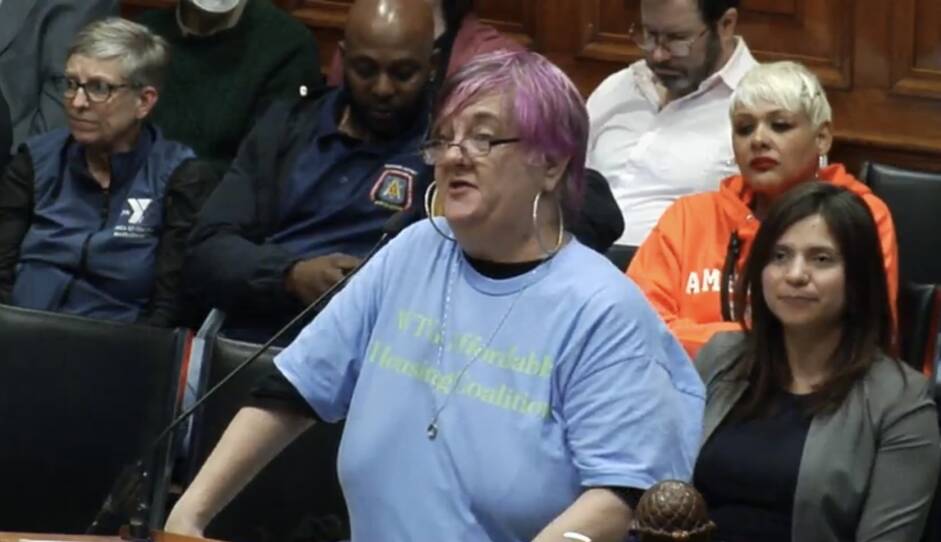After almost a year of deliberations, Worcester City Council voted on Tuesday to mandate that a minimum percentage of new housing units within private development projects be affordable for low- to moderate-income households.
But although the inclusionary zoning ordinance is meant to address Worcester’s shortage of affordable apartments, housing advocates and some city councilors say it does not go far enough.
Four councilors voted to pass a more progressive version of the policy that would ensure some of the inclusionary-zoned units are affordable for families earning less than $60,000 annually, which make up a majority of the city’s renter population. However, other councilors as well as City Manager Eric Batista’s administration believed such a policy could make housing projects less profitable and therefore scare developers away from Worcester.
After the vote for the more progressive policy failed to gain the necessary supermajority to pass, the council unanimously voted for a more conservative ordinance that would let people with higher incomes — about $80,000 for a family of three — qualify for the affordable units.
“It’s incredibly disappointing,” said Gina Plata-Nino, a member of the Worcester Together Affordable Housing Coalition, which pushed for the bolder ordinance. “The vote is not going to change much for community members to be able to afford a place to live.”
Dozens of other Massachusetts communities already have implemented some form of inclusionary zoning. That helped fuel the city of Worcester’s decision to begin considering its own policy in spring 2022. The ensuing debate over the last 11 months has come as Worcester continues to see record-high rents , displacing renters and making some homeless. According to the Massachusetts Housing Partnership , nearly half of renters in the city are cost-burdened — meaning they pay more than 30% of their income on rent and utilities.
Although thousands of new housing units have opened up in recent years to meet the rising demand, most tailor to high-income renters leaving few housing options for people with lower wages. That was a main concern among more than 20 people who spoke in favor of the more progressive version of the inclusionary zoning ordinance during the public comment period at Tuesday’s meeting.
“[Worcester’s] the place I want to call home. But just looking at the housing that’s available. The high housing prices are putting that out of reach for a lot of people,” said Worcester resident Andrew Marsh.
Other speakers included a homeless teenager living in a hotel and a realtor who had to relocate from Worcester because she could no longer afford it. The speakers called on councilors to be “bold” and “brave” by choosing Worcester residents over developers' pockets.
“We need affordable housing in Worcester,” Domenica Perrone said. “I ask you then, when will we begin to respond to said crisis appropriately? When will we finally give it the attention it deserves?”

Councilors Etel Haxhiaj, Sarai Rivera, Khrystian King and Thu Nguyen voted in favor of the more progressive version of the inclusionary zoning ordinance, saying they’re tired of people having to leave Worcester because they can no longer afford it.
Noting that Worcester’s the second largest city in New England, King and Haxhiaj argued developers will continue to build in the city even with the ordinance. They said other cities like Boston and San Francisco also have implemented more aggressive versions of inclusionary zoning but have not seen significant reductions in housing development as a result.
“Fears are not facts,” King said. “We have to stand up on behalf of our families. … Wages are low, rents are high, families are struggling and we know the disproportionate impacts that it has on people of color, folks of low socioeconomic status, immigrants.”
In response, Mayor Joe Petty, who voted against the stronger ordinance, acknowledged the city’s affordable housing shortage but added it’s a problem statewide. He said Worcester can’t take the issue on by itself and reiterated concerns about the impact the more forceful ordinance would have on future development.
Councilor Sean Rose agreed, arguing the ordinance should give developers flexibility to determine the income threshold for their affordable units. He said housing builders already are dealing with rising interest rates and increasing costs of construction. If the inclusionary zoning restrictions are too strict, he said, developers could struggle to finance and secure loans for their projects.
“I believe it’s impossible to go backwards if we overshoot restrictions at the outset,” Rose said.
Worcester Chief Development Officer Peter Dunn has said the more conservative ordinance will still encourage developers to include units for lower-income people. If a developer does so, they won’t be required to include as many affordable units in their projects than if they set aside the affordable apartments for higher income people.
Rose proposed an amendment that he said could be another incentive for developers. If they include units for people making 60% of the area median income — about $59,700 for a three-person family — the amendment will allow them to build denser housing with fewer parking spaces than the city usually requires.








